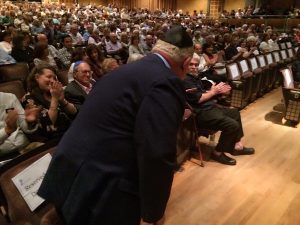Rabbi Wilfred Shuchat, who served as the spiritual bedrock for generations of people during his seven-decade long association with Montreal’s largest and wealthiest synagogue, is being remembered for his devotion, stoicism and decency.
His influence was felt well beyond Congregation Shaar Hashomayim, as he left a lasting imprint on the entire Montreal Jewish community.
Rabbi Shuchat, who died at age 98 on Dec. 27, was Shaar Hashomayim’s senior rabbi from 1948 to 1993, after serving two years as assistant rabbi. From his retirement until his death, he was rabbi emeritus, a role he fulfilled as faithfully as he had throughout his active years in the pulpit.
At his funeral on Dec. 30 at the Westmount, Que., synagogue, the shul’s current rabbi, Adam Scheier, said Rabbi Shuchat provided an “unflinching stability that anchored this community.
“He brought so much dignity to his profession and community … yet never took himself too seriously.”
Rabbi Shuchat not only led and wrote about the Shaar Hashomaym, but “crafted its history,” and a tone for the wider community through his fidelity to Jewish law and ritual, his commitment to Israel and his open spirit, said Rabbi Scheier.
One of his many accomplishments cited by his son, Rabbi Bernard Raphael Shuchat, was the creation of the interdenominational Montreal Board of Jewish Ministers that brought together rabbis from different streams of Judaism. That was possible because they all respected Rabbi Shuchat, he said.
Where else but at his father’s home could Rabbi Harry Stern of Temple Emanu-El and Lubavitch Rabbi Leib Kramer be seen dancing together, he asked.
Born in Montreal on June 6, 1920, Rabbi Shuchat was the son of a furrier and was brought up in an observant family. But he did not think of becoming a rabbi until he was studying psychology at McGill University and heard a lecture by Rabbi Mordecai Kaplan, who went on to found Reconstructionist Judaism.
Although he was Orthodox, Shuchat decided to study at the Jewish Theological Seminary, a Conservative institution, in large part because Rabbi Kaplan was teaching homiletics there.
Rabbi Shuchat was famous for his oratory and powerful voice. Even those in the back row could always hear his sermons. The content was also crucial. “Every sermon had to be a masterpiece,” said Rabbi Bernard Shuchat.
READ: HAROLD CAMMY LAUDED FOR ALMOST HALF-CENTURY IN CÔTE-ST-LUC, QUE., SPORTS
After two years in Buffalo, N.Y., Rabbi Shuchat returned to his native city in 1946, to assist Rabbi Herman Abramowitz, who had, since 1902, been the spiritual leader of the Shaar Hashomayim, the second oldest, and first Ashkenazic, congregation in Montreal.
The Shaar Hashomayim grew rapidly and by 1965, it had 1,750 member families, which necessitated a major expansion.
History will record that Rabbi Shuchat, along with supermarket magnate Sam Steinberg, conceived of the impressive Pavilion of Judaism at Expo 67, which drew a million visitors. It was the first exhibit dedicated to the religion at any world’s fair.
Rabbi Shuchat authored a history of his congregation called The Gate of Heaven in 2000 and subsequently wrote three books related to the midrash. A fourth was due to be published in February.
Rabbi Shuchat’s interest in scholarship prompted him to create numerous study groups and educational programs, which were open to all, as well as a third service for anyone who could not afford a High Holiday seat.
Under his leadership, the Shaar Hashomayim followed a distinct style of worship that was traditional and formal, yet reflected what his son calls his father’s universalism and open-mindedness.
In wishing to “set the record straight,” his son said that, while his father was among a small minority within the Conservative movement’s Rabbinical Assembly that voted against women becoming cantors in 1982 – and left permanently when it did so – he had a deep appreciation for women scholars. He was in favour of the Shaar Hashomayim’s groundbreaking appointment of Maharat Rachel Kohl Finegold as a member of its clergy in 2013.
Rabbi Shuchat was famous for never missing a minyan and often being the first to show up at the synagogue. That did not change, even as his health deteriorated. He became legally blind and relied on a walker in his later years, but kept the routine. During his final illness, his main concern was when he could get back to it.
Rabbi Shuchat exhibited his unflagging faith through personal adversity, having witnessed the deaths of his daughter Elizabeth in 1999 at age 41 and of his wife Miriam in 2012. His devoted and tender care for her during the last seven years of her life touched everyone who knew the couple.
An outstanding characteristic was his selflessness, said his son-in-law, Rabbi Yakov Schwartz. “He had no personal agenda. He asked for little and gave a lot.”
Rabbi Shuchat visited the sick regularly and tended to the “poor and broken” who came to his door with as much concern as he did his more fortunate flock, his son said.
He summed up his father’s humility, recalling him recently saying: “I don’t know why I’ve lived so long. I did nothing special.”









